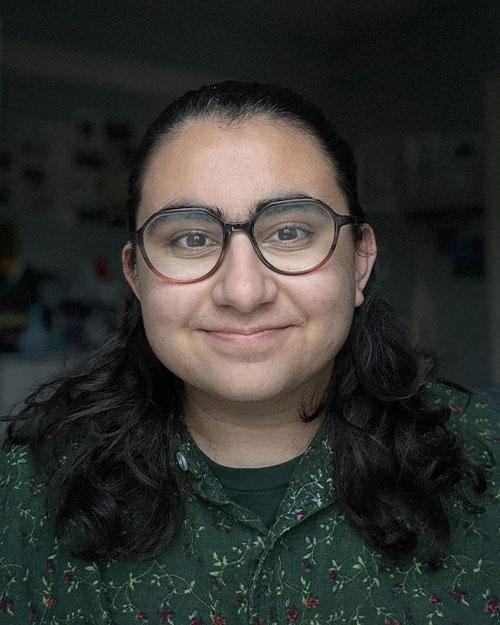Instructor Spotlight: Noah Shapiro-Gibbons

Tell us about yourself and what inspired you to teach this course
I’ve been studying queer theory throughout my college journey, and have noticed that the pieces on queer time and queer temporalities have always been the ones that shift my perspective the most, and that push me to imagine the other worlds that are possible. I’ve found that my experiences as a trans person and my understanding of these nebulous ideas of queer time and queer worldmaking were in direct conversation with each other, so I started doing more research into trans specific queer time theory. The texts I found have helped me situate myself as a trans person in the world, to understand my place in the long and loving lineage of trans people who have come before me, and perhaps most importantly to imagine and dream the futures I want to live in.
Your course discusses trans ideas of time, and you have a week on “non-linear aging.” Can you explain what that means and why it’s important?
In trans studies, non-linear aging is the idea that trans people experience time and the aging process differently than cisgender people. For example, linear cisheteronormativity presumes that everyone will be born, grow up, go through puberty, get married, have kids, and die, in that order. There are many people, trans and otherwise, who do not go through these “steps” at all or in that order. We can imagine, for instance, a trans person who starts hormone therapy as an adult and is now going through puberty again. These kinds of moments are common to the trans experience; for as long as trans people have been around we have skipped around the expected timelines of coming of age. These are the kinds of warps and disruptions that create this process of non-linear aging.
The reason trans non-linear aging is important is because of the cis anxieties around trans aging. In so much of the anti-trans legislation around the country right now, major talking points come back to fear mongering around the effects of gender affirming care. I take from Lily Alexandre in saying that many of the so-called “disastrous” side effects of hormone therapy are things that will happen to all of us, regardless of transness, as we age: hair loss and balding, infertility, changes to sex drive. If we understand transness as something that inherently changes our relationship to aging and time, these “side effects” are not nearly as drastic as transphobes will make them out to seem. We also understand that cisgender aging is a socially acceptable reason to receive gender affirming hormone therapy (estrogen for menopause, for example), so it is fair to study trans aging and trans relationships to time to therefore better understand why trans people are denied access to hormone therapy and gender affirming care.
You reference a variety of trans resources archives such as TransReads and the Queer Zine Archive Project (QZAP). Could you talk to the importance of these databases and how they serve the queer, trans, and broader community?
Online archives like QZAP and TransReads are so vitally important because they provide access to texts about trans people and about trans issues entirely for free! The best thing about TransReads and the Digital Transgender Archive especially is the wealth of everyday trans knowledge they hold. So much of transness is built on community and from learning from each other, and it always has been. Before the advent of the internet as we know it today, many trans folks in the U.S. stayed connected between cities and across communities through magazines, zines, and journals. Being able to have access to the wisdom from all of those publications online is amazing; we can see all the ways our community has changed, how trans medicine has evolved over the years, and all the same arguments we’ve been having for 50 years. These moments of community recognition across different times are instances of touching/feeling that ultimately bridge the gaps between times. We always have more to learn from our elders, and databases like TransReads, the Digital Transgender Archive, and QZAP make that learning more accessible to all of us.
Your last class session talks about utopias. Why is the imagining work so important, and what’s one aspect of a trans utopia you’d like to see?
Imaginative work is so important because it is a seed of hope. In order to bring about another world, to truly bring a revolution, one must be able to imagine the world they want to live in. So many of us are so stuck in the world we live in that we cannot imagine the world without capitalism, without white supremacy, without patriarchy. In that way, the imagination is a weapon of the people and it is vital that we support it. What are the possibilities of transness we have not yet dreamed of?
What do you hope that students will take away from your course?
I hope students will take away some more tools for their brilliant, artistic, and political imaginations. Especially now, when we are seeing so much censorship and punishment of student activism for Palestine at Tufts and around the country, it is so important to nurture our imaginations so that we can organize for a future we want to live in. I also hope they take away a sense of community with each other; it’s lonely being the only trans person in a classroom and being in community is healing, at least for me!
Noah Gibbons-Shapiro (they/them) is a senior majoring in Race, Colonialism, and Diaspora studies focusing on American Studies with a minor in Theater, Dance, and Performance Studies. They are from San Jose, California and spend their time on campus organizing with Students for Justice in Palestine.